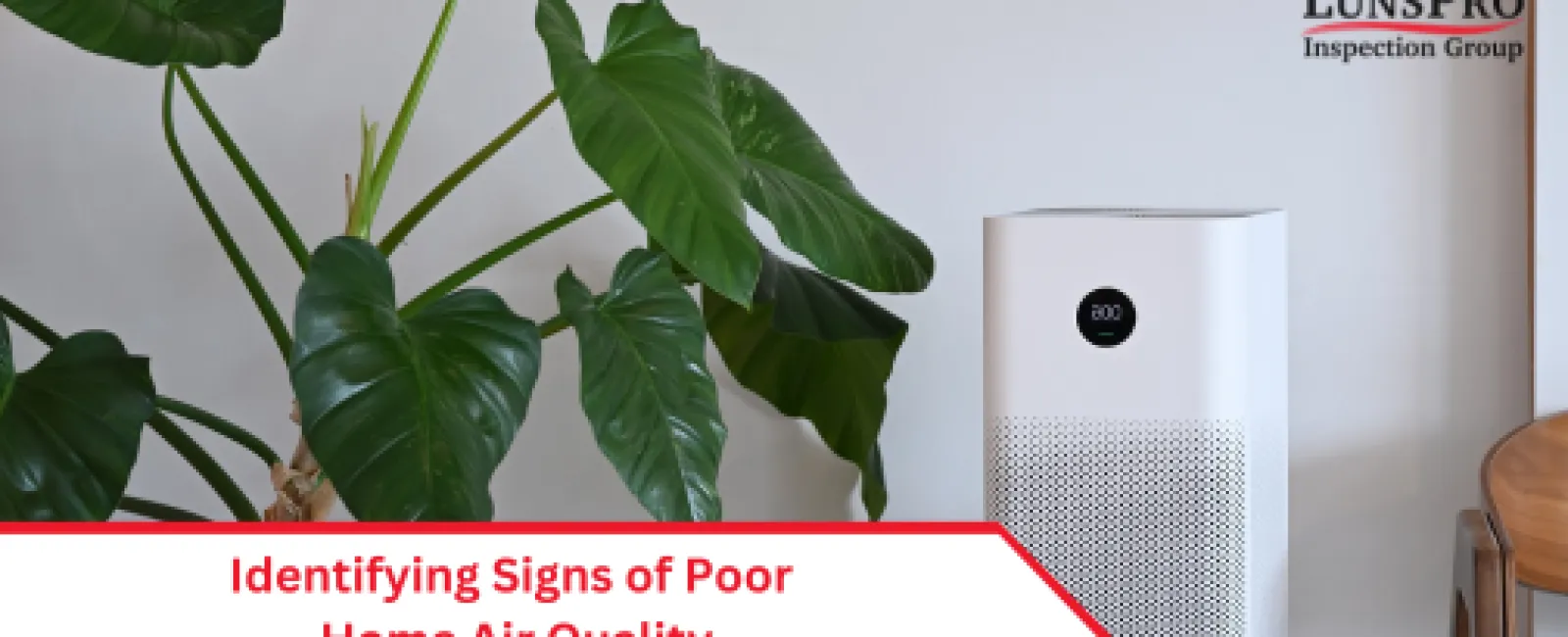Maintaining good air quality in your home is critical to ensuring a healthy living environment for you and your family. However, poor indoor air quality often goes unnoticed until symptoms become too obvious to ignore. Understanding how to identify the signs of poor air quality and taking steps to improve it can protect your health and enhance your overall comfort. At LunsPro Inspection Group, we've seen firsthand during our Carolina residential and commercial home inspections how air quality issues can impact homes in North Carolina.
Why Home Air Quality Matters
The air you breathe inside your home affects your well-being, from short-term comfort to long-term health outcomes. Polluted indoor air can lead to respiratory problems, fatigue, and even exacerbate chronic conditions like asthma and allergies. This is particularly true in North Carolina, where a mix of environmental factors like seasonal allergens, humidity, and regional pollutants can significantly impact air quality. LunsPro Inspection Group is committed to educating homeowners during our inspections to identify these issues and address them effectively.
Common Causes of Poor Indoor Air Quality
Understanding what contributes to poor air quality is the first step to improving it. Some of the most common causes include:
Inadequate Ventilation
Poor ventilation can trap pollutants inside, leading to stale and unhealthy air. Homes in North Carolina often rely on HVAC systems, and if these systems are not maintained, they can exacerbate the issue.Humidity and Mold
High humidity levels, especially in the southern states, create the perfect environment for mold and mildew growth. Mold spores are a significant allergen and can worsen air quality dramatically.Chemical Pollutants
Everyday household products like cleaning agents, paints, and even furniture can release volatile organic compounds (VOCs) that degrade air quality. During Carolina residential and commercial home inspections, we frequently identify these pollutants as hidden contributors to poor air quality.Outdoor Pollutants
Pollutants from outside, such as pollen and industrial emissions, can seep indoors, particularly if windows and doors are not properly sealed.Dust and Pet Dander
Dust, dirt, and pet dander are common allergens that accumulate in poorly maintained homes. Without regular cleaning, these particulates can significantly impact the air you breathe.
Signs of Poor Home Air Quality
Identifying poor air quality requires paying attention to subtle signs. Here are some indicators:
Frequent Allergies or Respiratory Issues
If you or your family experience persistent allergies, sneezing, or coughing indoors, it may signal poor air quality. Asthma symptoms can also worsen in these conditions.Visible Mold Growth
Mold spots on walls, ceilings, or near HVAC systems indicate excessive moisture and poor air circulation.Unpleasant Odors
Stale or musty smells can result from mold, mildew, or other contaminants in your home. These odors often point to underlying air quality issues.Increased Dust Accumulation
If surfaces in your home seem to gather dust quickly, this may suggest an overloaded HVAC system or insufficient air filtration.Humidity Issues
Condensation on windows or walls is a clear sign of high indoor humidity, which can lead to air quality problems.Fatigue or Headaches
Prolonged exposure to VOCs or other airborne chemicals may cause headaches, fatigue, and even nausea.
Steps to Improve Home Air Quality
Thankfully, poor air quality is a solvable problem. By addressing the root causes, you can create a healthier indoor environment.
Schedule Regular Home Inspections
The first step to improving air quality is understanding the current state of your home. LunsPro Inspection Group offers North Carolina home inspections that evaluate not only structural issues but also environmental concerns that can impact air quality.Improve Ventilation
Open windows regularly to circulate fresh air. Use exhaust fans in bathrooms and kitchens to remove excess humidity and odors.Maintain HVAC Systems
Change air filters every 1-3 months and schedule professional HVAC maintenance annually. Upgrading to high-efficiency particulate air (HEPA) filters can significantly reduce airborne allergens.Control Humidity Levels
Aim to keep indoor humidity between 30-50%. Using a dehumidifier, particularly in damp areas like basements, can help prevent mold growth and maintain optimal air quality.Eliminate Mold and Mildew
Address mold immediately by cleaning affected areas with mold-specific cleaning products. Ensure the root cause, such as leaks or poor ventilation, is resolved to prevent recurrence.Use Natural Cleaning Products
Reduce your exposure to VOCs by choosing non-toxic, eco-friendly cleaning products. Avoid air fresheners and scented candles that can emit harmful chemicals.Install Air Purifiers
High-quality air purifiers can remove allergens, pet dander, and even microscopic pollutants from your home's air. This is particularly useful in homes with pets or individuals prone to allergies.Seal Gaps and Cracks
Inspect windows, doors, and walls for gaps where outdoor pollutants might enter. Sealing these gaps not only improves air quality but also enhances energy efficiency.
The Role of Inspections in Ensuring Good Air Quality
During Carolina residential and commercial home inspections, professionals at LunsPro Inspection Group often uncover issues that homeowners were unaware of. For example:
- Leaky Ducts: These can distribute contaminants like dust and mold throughout the house.
- Roof or Plumbing Leaks: Unaddressed leaks create moist environments conducive to mold.
- Foundation Issues: Poor sealing can allow radon, a harmful gas, to seep indoors.
North Carolina home inspections by LunsPro Inspection Group provide detailed reports that help you address air quality challenges at their source, giving you peace of mind.
Benefits of Good Indoor Air Quality
When you take steps to improve air quality, you'll notice benefits almost immediately, including:
- Reduced allergy symptoms and respiratory issues.
- Improved sleep quality due to cleaner, fresher air.
- Increased energy levels and reduced fatigue.
- Protection against long-term health risks associated with pollutants.
In addition, a home with good air quality is often more attractive to buyers, as it indicates proper maintenance and care.
The air inside your home directly impacts your health and quality of life, making it essential to address air quality issues proactively. Whether it's controlling humidity, maintaining your HVAC system, or sealing your home's structure, these measures can go a long way in creating a healthier indoor environment.
LunsPro Inspection Group is proud to serve homeowners across the Carolinas, providing comprehensive residential and commercial inspections that uncover hidden issues and promote a safer, healthier living space. By identifying air quality challenges during North Carolina home inspections, we empower you to take the necessary steps to improve your home and protect your family.
Don't let poor air quality go unnoticed. Contact LunsPro Inspection Group today to schedule your inspection and ensure your home is a haven of health and comfort. With our expertise, you can breathe easier knowing your indoor environment is safe and clean.

